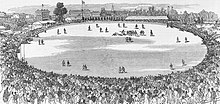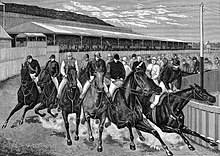George Coulthard
[1] As a professional cricketer, he played at club level for Melbourne, represented Victoria in five first-class intercolonial matches, and made one Test appearance for Australia, against England in 1882.
[3] Off the field, he ran a tobacco and sporting goods store in Lygon Street, Carlton, and won additional fame for surviving a shark attack off Shark Island, fighting bare-knuckle boxing champion Jem "The Gypsy" Mace, and being the alleged source of a dream premonition that convinced many Melbourne Cup punters to back a horse with long odds (the horse finished close to last).
In 1882, while serving as the England cricket team's umpire on its first quest to regain The Ashes, Coulthard became ill with tuberculosis, from which he died the following year, aged 27.
Carlton won playing Australian rules and claimed a 1–1 draw in the rugby match in defiance of the opposing team's umpire, who disputed their goal; the Waratahs eventually allowed it under protest in order for the game to continue.
[18] The club denied rumours that it had lured its star player back with financial incentives, stating that Coulthard returned due to a falling out with his associates in Sydney.
[19] Nonetheless, the shark entered sporting folklore in the 20th century as the reason why Coulthard abandoned his plans in Sydney, which, as the story goes, kept Australian rules from becoming the city's most popular football code.
[24] Coulthard was Carlton's best in its first match of the 1879 VFA season, a 4–0 win over Albert Park in which he scored a goal after using an innovative dodging tactic that, according to one observer, left his opponents "standing looking on at the cool operation like a lot of demented geese".
Back, forward, or following, and nowhere out of place, the grandest player of the day, it is doubtful if for general excellence his equal has ever been seen in Victoria.Coulthard kicked all five goals in the first game of the 1880 VFA season.
[32] Later that month, in a major match against reigning premiers Geelong, Coulthard fainted after opponent George "Hercules" Watson felled and injured him behind play.
[34] In July of the 1881 VFA season, Coulthard, attempting a mark in front of Carlton's goal, was tackled by a Melbourne opponent and accidentally kicked behind the right ear.
[36] He struggled during Carlton's 1881 tour of Adelaide, the local press stating that he was manned so persistently due to his footballing reputation that "he does not get the same chance of showing his sterling qualities".
After assessing the evidence, the bulk of which showed Tankard to be the aggressor, the VFA determined that Coulthard was "more to blame" for the fracas, with chairman H. C. A. Harrison expressing the opinion that "bad language is far worse than blows.
[45][48] The incident also served as a fulcrum for debate on the role of the media; one journalist in particular was criticised for sensationalising the fight, and in turn, influencing the VFA's decision to investigate it.
[48] While Hotham abided by the ruling, Carlton was heavily censured for refusing to enter the field in its next arranged match, against Melbourne, unless Coulthard was allowed to play.
In 1878–79, he went in as a substitute for a Victorian XV during a match against the first representative Australian team,[59] and batted in the lower order for the MCC when it hosted New Zealand's visiting Canterbury XI.
As a hired professional, Coulthard was viewed with suspicion by many Sydneysiders (the local custom was to use amateur umpires), and, in an era of intense rivalry between the colonies, the fact that he was a Victorian only deepened their distrust.
[65] Even so, New South Wales was tipped to win based on England's losses in Victoria, and illegal gamblers had placed heavy bets in favour of the home side.
In reply to the tourists' first innings total of 267, Billy Murdoch, the star of New South Wales, carried his bat for 82 out of 177 and had reached 10 in the follow-on when Coulthard gave him run out.
[64] Ignoring his team's umpire Edmund Barton, who deemed the run out fair,[69] New South Wales captain Dave Gregory threatened to abandon the match unless Harris had Coulthard replaced.
[72] Harris, in defending Coulthard, was struck with a heavy stick, and A. N. "Monkey" Hornby collared and dragged the assailant to the pavilion, taking punches and nearly losing his shirt in the process.
[74][75] Two attempts were made to resume the match, but when the rioters learned of Harris' refusal to withdraw Coulthard, they again rushed the ground and stayed there until the scheduled end of play.
[76] Following a joint apology from New South Wales cricket officials, Harris agreed to continue the match after Sunday break on the condition that Coulthard stood in as umpire.
[79] He wrote an open letter to The Sydney Evening News denying accusations that he had bets on the match,[80] and Harris stated publicly that had he suspected his umpire of taking any interest in the result, he would not have employed him.
[81] Speaking at a banquet given to the England team in Melbourne at the end of the tour, Lord Harris reaffirmed his belief that Murdoch was correctly given out, and, to the applause of the audience, stated that he and his men "had met with no better or fairer umpire than Mr.
[85][86][87] Given the inconsistency of his first-class outings, it is considered an oddity that, during the 1881–82 season, Coulthard, then Victoria's twelfth man, was selected to play for Australia against Alfred Shaw's touring England team following the withdrawal through injury of Alick Bannerman and Fred Spofforth.
The story went that Coulthard, lying on his deathbed, dreamt that Martini-Henry would win the Victoria Derby, Dirk Hatteraick the Melbourne Cup, and that he himself would die before the first-named race was run.
[117] When he died before Martini-Henry won the Derby, a "rush of superstitious punters" placed bets on Dirk Hatteraick to win the Cup, causing a sharp drop in odds, despite the fact that, in the words of one turf writer, the horse was "as fat as a bacon hog".
[121] Coulthard is often ranked alongside Jack Worrall, Albert Thurgood and Fred McGinis as one of the greatest Australian rules footballers to emerge in the first fifty years of the game.
He was the brightest star in the galaxy, such as does not, even to-day, shed its effulgent beams on Carlton.Early football historian C. C. Mullen retrospectively named Coulthard the "Champion of the Colony" for the years 1876, 1877 and 1879.
[124] Coulthard was named as a follower in historian Mark Pennings' "Team of the Nineteenth Century", published in the fifth and final volume of his Origins of Australian Football series (2016).






